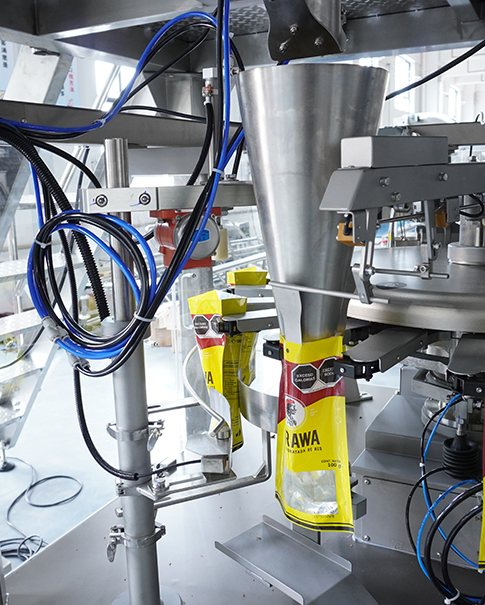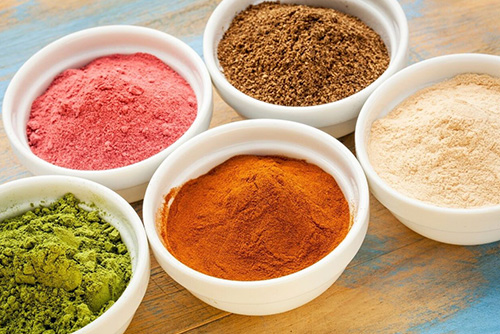How To Choose A Right Powder Packing Machine
Feb 25, 2025
Choosing the right powder packing machine is a crucial step in the production process, directly affecting efficiency, packaging quality, and overall production costs. Therefore, it's important to carefully select a machine that suits the specific needs of your business. Here are several key factors to consider when choosing a powder packaging machine.
1. Characteristics of the Product
Powder packaging machines are mainly used for packaging powdered products such as coffee powder, milk powder, spices, flour, etc. The physical characteristics of the product, such as particle size, flowability, and moisture content, will greatly influence the machine selection. The machine should be designed to meet the specific requirements of the product being packaged.
Particle Size & Flowability: If the powder has large particles or poor flowability, choose a machine with higher precision and stronger feeding capacity.
Moisture & Stickiness: For moist or sticky powders, select a machine with features to prevent clumping or blocking during the packaging process.
2. Packaging Speed & Production Capacity
The required packaging speed and production capacity will depend on your production needs. If you're working with high volumes, you'll need a machine with high-speed and high-efficiency capabilities to increase productivity. Packaging machines are typically rated by the number of bags per minute or the amount of product they can package per hour.
Small-scale Production: For smaller production volumes, a machine with moderate speed and lower automation may be suitable and will be less expensive.
Large-scale Production: For large-scale operations, high-speed, fully automated machines are recommended to maximize output and reduce labor costs.
3. Level of Automation
Most modern powder packaging machines offer automation features such as automatic weighing, filling, sealing, and labeling. Choosing a machine with a higher level of automation can reduce manual intervention and improve overall production efficiency.
Fully Automatic Powder Packing Machines: These machines offer higher levels of automation and can handle the entire packaging process with minimal operator input, ideal for large-scale operations.
Semi-automatic Powder Packing Machines: Suitable for medium or small-scale production, where the operator may still need to perform some tasks but with reduced workload.
4. Packaging Materials & Formats
Different packaging materials and formats require different types of machines. Common materials include plastic films, composite films, and aluminum foil bags. You should choose equipment that is compatible with the packaging materials and formats you intend to use.
Bag Packaging: Machines should be able to create various types of packaging such as pillow bags, three-side-seal bags, or four-side-seal bags, depending on your needs.
Large or Bulk Packaging: If you need to package in large bags or containers, the machine should be capable of handling larger volumes of powder.
5. Machine Stability & Accuracy
The accuracy of the powder packaging machine directly impacts the weight and quality of each package. If the weight of each package is inconsistent, it could affect both consumer experience and compliance with regulatory standards. A machine with a high-precision weighing system ensures accurate filling.
Additionally, the stability of the equipment is crucial. Machines that frequently experience breakdowns can cause delays and lower production efficiency.
6. Cleaning and Maintenance
Long-term use of powder packaging machines can lead to the accumulation of dust and debris, so ease of cleaning is an important consideration. The machine should be easy to disassemble for cleaning, especially if you're packaging products that require high hygiene standards.
Easy Disassembly: The machine should have a design that allows for easy removal of parts that require cleaning, minimizing powder residue.
Material Selection: Opt for machines made of food-grade, stainless steel materials to ensure durability and hygiene over time.
7. After-sales Service & Technical Support
After purchasing a powder packaging machine, having access to timely maintenance and technical support is essential. Good after-sales service can help you resolve issues quickly and ensure the machine runs smoothly over time.
Repair & Maintenance Services: Ensure that the supplier offers repair services and replacement parts in case of malfunction.
Training: The supplier should also provide operator training to ensure that employees can operate the machine correctly and efficiently.
8. Budget & Cost-effectiveness
The price of a powder packaging machine varies widely depending on the brand, features, and level of automation. It's important to balance your needs with your budget. While it might be tempting to opt for the cheapest machine, don't overlook factors like quality, reliability, and after-sales support.
By choosing the right machine, you can significantly enhance production efficiency, reduce costs, and ensure a high-quality end product. Whether you're producing on a small or large scale, selecting the appropriate packaging machine is key to the long-term success of your business.

